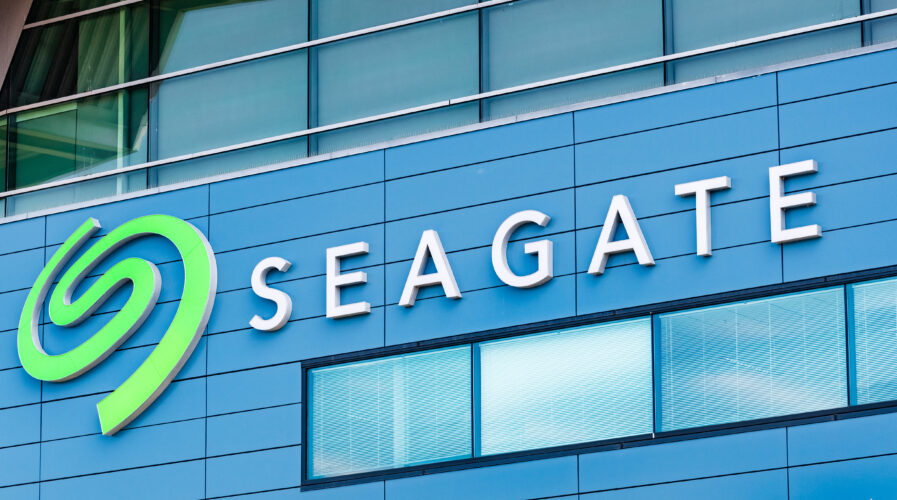
(Source – Shutterstock)
Seagate simplifies storage for organizations’ datasphere
With a presence of over 40 years and being a leader in storage technologies, nobody knows it better than Seagate. From HDDs to SSDs, Seagate has systems and hardware that can provide a wide set of offerings, Seagate has now also moved towards offering a cloud services solution.
And this is what businesses are looking for too. With data growing exponentially, the ability to have seamless storage capabilities is becoming extremely important. The datasphere, according to IDC, quantifies and analyzes the amount of data created, captured, and replicated in any given year across the world. It also looks at how much of that data is stored across various storage media (HDD, SSD, NVM-NAND, NVM-other, optical, and tape) in the Global StorageSphere. The growing upsurge in data volumes requires a system that can be integrated easily, and bring value to businesses.
While the multi-cloud has become a mainstream cloud strategy for today’s datasphere, there are still complex challenges businesses face, especially with unpredictable costs hindering optimal data utilization. In Singapore for example, the Multicloud Maturity Report by Seagate shows that over 80% of Singaporean organizations surveyed agree that the complexity and volume of data they produce make it hard to understand what data can be used to generate business value. Moreover, 90% of Singaporean organizations surveyed agree that their organization is hampered by data retention costs (storage media costs, ingress and egress costs, etc.), which limits their ability to maximize value.
These challenges pose even larger roadblocks for data-intensive industries, where enterprises rely heavily on the vast amount of collected data to train their data analytics, AI, and machine learning systems. According to the research firm Gartner, only 53% of AI projects reach production stages from prototypes, due to the lack of the right tools to scale.
The complexities of cloud and storage

Ravi Naik, CIO and Executive Vice President for Storage Services at Seagate
For Ravi Naik, CIO and Executive Vice President for Storage Services at Seagate, as there’s a lot of data that is being generated; the need for it to be stored increases as well. With the growth of data analytics, machine learning, and AI, Naik pointed out that it is really about the extraction of value from all of this collected data.
In an interview with Tech Wire Asia during the Cloud Expo summit in Singapore, Naik explained that Seagate is looking at the growth of the datasphere, and looking at how best to help customers leverage not only their storage solutions but also to be able to extract data out of the storage that they consume.
“The conversations we’re having essentially are around simplifying storage architectures. It’s very important because as a practitioner, what I can tell you is it’s a very confusing world when it comes to storage products and technologies, whether it be on-premise systems or cloud solutions. Today’s cloud solutions are actually very complex,” explained Naik. “When the cloud was first envisioned, the promise of the public cloud was to simplify architectures, improve the TCO models for customers, and just make it very easy and frictionless. The exact opposite has happened. World architectures have become way more complex — customers struggle to really figure out what their costs are going to be. You can’t really predict the amount of money that they’re going to be spending.”
“And most importantly, I feel like we are being held hostage. We are brought into an environment and locked in with very big challenges in terms of moving the workloads off. And that’s because of egress costs and API costs and such. And what we’re trying to do is essentially change that dramatically. We will bring a paradigm shift in the way the cloud is architected, and the cloud is consumed,” commented Naik during Cloud Expo in Singapore.
Naik also highlighted that most customers often get caught up thinking about whether in the future, if there is a new solution offering, are they going to have a challenge migrating to it?
“We’re saying that you can bring your data in and you can take your data off without having to pay any money for data movement. You pay for what you store, and consume the storage. Essentially it is a significantly lower TCO model for customers. Given the fact that we are a storage company, we have the ability to offer storage and much better pricing. Customers really love what we have to offer,” mused Naik.
The Seagate Lyve Cloud
As part of its commitment to solving today’s mass data complexity challenges, Seagate launched Lyve Cloud in Singapore in February 2022 – the first market in Asia where the cloud storage platform was made available. During the summit, Seagate also announced the launch of Lyve Cloud Analytics platform, a complete cloud-based analytics solution that includes storage, compute, and analytics, to help Lyve Cloud customers lower the total cost of ownership (TCO) and accelerate time to value with their DataOps and MLOps (machine learning operations).
Adding the analytics capability to the most frictionless cloud storage, Seagate enables enterprises to activate their stored data in an open data lake architecture for analytics at petabyte scale, further accelerating time to implementation and innovation — yielding up to 40% cost savings compared to other available offerings in the market.
Leveraging its own leading manufacturing experience, Seagate is offering pre-configured full-stack analytics code solutions for time series, tabular data management, and image analytics along with included professional services that can dramatically reduce time to implement analytics in a production environment, from 12-18 months to under four months.
Lyve Cloud Analytics platform will benefit enterprises in manufacturing and other multi-petabyte data scale industries including the semiconductor, healthcare, retail, energy sectors and more.
In the second part of the interview, Naik will discuss how businesses make the most out of Lyve Cloud to avoid vendor lock-in as well as the security features that come with the service provided.
READ MORE
- Ethical AI: The renewed importance of safeguarding data and customer privacy in Generative AI applications
- How Japan balances AI-driven opportunities with cybersecurity needs
- Deploying SASE: Benchmarking your approach
- Insurance everywhere all at once: the digital transformation of the APAC insurance industry
- Google parent Alphabet eyes HubSpot: A potential acquisition shaping the future of CRM


